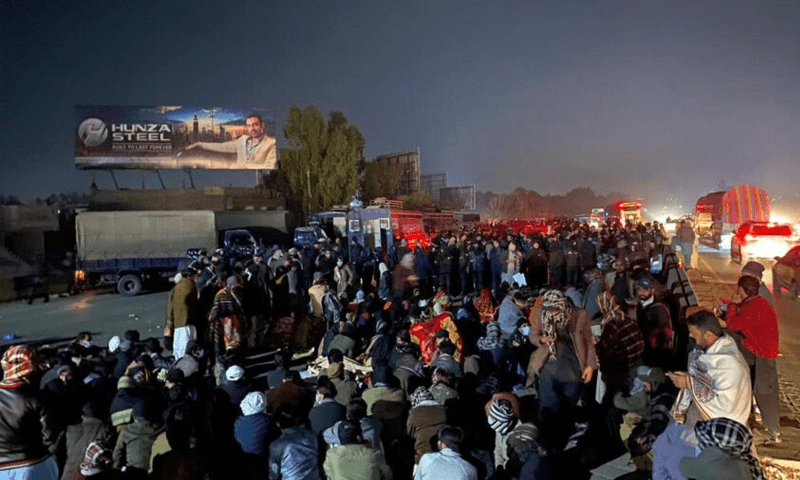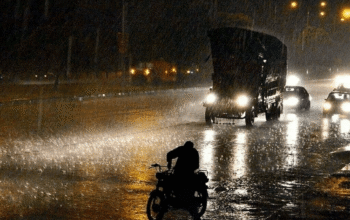By Staff Reporter
ISLAMABAD: The caretaker government on Thursday released hundreds of protesters who had been arrested a day earlier in the capital after a march against alleged human rights abuses in the troubled province of Balochistan turned violent.
The protesters, mostly women and children, had walked more than 1,000 miles from the southwestern city of Turbat to Islamabad, demanding justice for their relatives who they said had been forcibly disappeared or killed by state security forces in Balochistan.
The province, the largest and poorest in Pakistan, has been plagued by a separatist insurgency for decades, as some ethnic Baloch groups seek greater autonomy or independence from the central government. The Baloch also accuses the state of exploiting the province’s natural resources, such as gas, coal, and minerals, without sharing the benefits with the local population.
The march, which began in October, was led by Dr. Mahrang Baloch, a 30-year-old activist who said she became involved in the cause after her father and brother were abducted and killed by the authorities.
The protesters had planned to stage a sit-in outside the parliament building on Wednesday, but they were met with resistance from the police, who used water cannons and tear gas to disperse them. Some protesters threw stones at the police, and the clashes continued for several hours.
The police said they arrested 215 protesters for rioting and damaging public property. They also dismantled the tents and loudspeakers the protesters had set up outside the National Press Club, where they had been camping for the past few days.
Videos of the arrests circulated on social media, showing the police dragging and beating the protesters, many of whom were women and children. Police used water canons and tear gas on the protester. The images sparked outrage and condemnation from human rights activists, who accused the government of using excessive force and violating the protesters’ right to peaceful assembly.
The caretaker prime minister, Anwaar-ul-Haq Kakar, who took office in August after the dissolution of the previous government ahead of the general elections scheduled for next year, formed a three-member committee to negotiate with the protesters and their families.
The committee included Fawad Hassan Fawad, the minister for privatization; Murtaza Solangi, the minister for information; and Syed Jamal Shah, the minister for culture.
At a news conference, Fawad said the government had decided to release all the women and children who were arrested, as well as all the men who had been identified and cleared of any wrongdoing.
“It was decided that all women and children, without any exceptions, will be released. Further, all men who have been identified have also been released,” the minister said.
The minister said some protesters were still in custody, as they were being investigated for their involvement in the violence.
“We have also asked the Islamabad IG to try and not seek more time tomorrow and to identify them. Because we think that many things will come forward after [the process of] identification. Their origin and identity will help to determine whether they were supposed to be present or not or were there for a particular purpose.”
Fawad said the government had “credible evidence” that if the protesters staged a sit-in protest on a main road, certain nefarious elements would have misused that protest to their advantage.
“Some masked men pelted stones on police that led to a complicated situation,” he said. “As I said before, our conviction is that the protesters from Balochistan were not responsible [for this] … those were locals who wanted to exploit the situation.”
Meanwhile, the Human Rights Commission of Pakistan (HRCP) and Amnesty International expressed concerns over the “excessive use of force” by law enforcers against the marchers.
“HRCP strongly condemns the violent police crackdown on Baloch protesters in Islamabad, with women, children and the elderly subjected to unwarranted force in the form of water cannons and use of batons,” it said in a statement. “This treatment of Baloch citizens exercising their constitutional right to peaceful assembly is inexcusable… All those detained must be released unconditionally.”
Amnesty International also called on the government to conduct an impartial investigation into extrajudicial killings and enforced disappearances, particularly in Balochistan, in line with international standards.
Last month, the Counter Terrorism Department (CTD) Balochistan issued a statement, saying Balach Baloch, the man killed in Turbat, had confessed in custody to being a militant and carrying out a number of attacks. He was arrested on Nov. 20, as per the statement, in possession of five kilograms of explosive materials.
Balach was later killed in a raid on a militant hideout in the city of Turbat. The killing unleashed sit-ins and strikes across the province. Balach’s family has refuted CTD claims, saying he was not involved in any unlawful activities but was picked up by the CTD on Oct. 29 and later killed in a “fake encounter.”
Copyright © 2021 Independent Pakistan | All rights reserved




